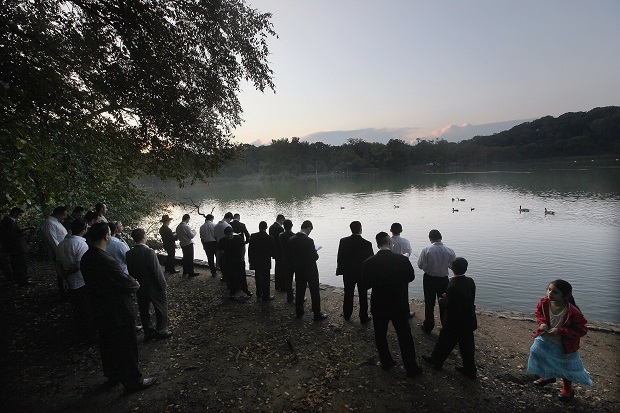Happy New Year! No, it isn’t three months’ early if you’re Jewish, and those of you who aren’t might like to cash in on the celebration. So, in honour of Rosh Hashanah – Jewish New Year – today, I thought I’d pick out a few of my favourite Jewish books. This proved to be such a hopelessly vast category, however, that I’ve narrowed it down to books about Jewish London – the place where 60% of British Jews, including myself, live.
Whether or not you’re Jewish, might I encourage you to pick up one of these excellent books as a means both of discovery and of celebration. Happy New Year, and happy reading.
1). Journey through a Small Planet by Emanuel Litvinoff
Emanuel Litvinoff grew up in the East End in the 1920s and 30s, when it was a predominantly Jewish area. In this collection of autobiographical tales he takes us back to a place where ‘people spoke of Warsaw, Kishinev, Kiev, Kharkov, Odessa as if they were neighbouring suburbs’. Brick Lane is now a place for curries and nightclubs, but then it was where herring-women plunged ‘their chapped and swollen fingers into the open barrels of picked fish’. Spitalfields Market, now smartened up to be little more than an arcade of chain shops and restaurants, was then a place to scavenge rotting vegetables. It is eye-opening to share the helter-skelter of Litvinoff’s life, from his first day at school to his attempt to be a revolutionary communist, before becoming a down-and-out and wandering the streets of Soho at night, until eventually he felt the first stirrings of poetry within him, while stirring a pot of glue. It’s a lost world, and one worth revisiting while wandering today’s rather more chic Spitalfields streets.
2). Rodinsky’s Room by Rachel Lichtenstein and Iain Sinclair
In this highly unusual detective story, Rachel Lichtenstein discovers what became of David Rodinsky, who, in the late 1960s, seemed to vanish into thin air from his Whitechapel garret. Simultaneously, Iain Sinclair explores how Lichtenstein’s journey in pursuit of Rodinsky is in fact one of her own self-discovery. We begin in Rodinsky’s eerie abandoned room, discovered in 1980 untouched for over a decade, when the porridge, thick with dust, was still on the stove and a half-finished cup of tea sat by the bed; in the cupboard hung time-stiffened pyjamas and in his books lay cryptically annotated chocolate wrappers. Lichtenstein’s quest takes her beyond these compelling four walls, to the London suburbs, Essex and to Poland, before returning to the East End. A fascinating story emerges of how two Jewish families – the Lichtensteins and the Rodinskys – came to London and took very different paths, which join together in this intelligent and curious book.
3). The Innocents by Francesca Segal
Today, London’s Jews tend to live in North-West London rather than the East End. In this present-day novel, we are shown around gossipy Hampstead Garden Suburb and aspirational Belsize Park, with their own unique charms and limitations, albeit lacking the nostalgic romance of Whitechapel’s neighbourly squalor. Segal has taken the basic love triangle plot from Wharton’s The Age of Innocence and re-imagined it in this very different setting – benefitting incidentally from the irony of Wharton being notoriously anti-semitic. Segal excels with her pen portraits of minor characters, hinting at the diversity in this world bound together by Friday night dinners, Israel Tour and strong opinions on where to get the best bagels. The Innocents won the Costa Prize for Fiction and is a great read for anyone who has experienced growing up in a somewhat segregated society, as well as shining a light on the idiosyncratic world of Jewish North-West London.
4). The Finkler Question by Howard Jacobson
Julian Treslove, the protagonist of this funny and eccentric Booker Prize-winning novel, who begins the story by getting mugged by a woman round the corner from the BBC, is not Jewish. His two oldest friends are, however, and it is thanks to one of them that we get the unusual title: Treslove thinks his friend Sam Finkler so epitomises Jewishness that he privately takes his name to be a synonym for Jewish. Hence ‘The Jewish Question’ becomes ‘The Finkler Question’, and thereby, thinks Treslove, removing any stigma. Enjoyable and provocative from the very start, Jacobson steers us through musings on subjects as varied as love, death and Israel, while negotiating the eternal puzzle of ‘what Finklers were permitted to say about themselves that non-Finklers were not’.
5). Daniel Deronda by George Eliot
In Eliot’s wonderful and final novel, she tackles ‘The Finkler Question’ head on. Daniel Deronda is a young aristocrat, who narrowly avoids falling for the self-centred Gwendolen Harleth before rescuing a young Jewish woman from trying to drown herself. As he helps her to find her family, he is drawn into the Jewish community of late-nineteenth-century London and the early debate around Zionism. On the publication of Daniel Deronda in 1876, many gentiles resented Eliot’s including so much about the Jews, and many Jews wished she hadn’t included so much about the gentiles. Surprisingly, as recently as 1982, F.R. Leavis called for the Jewish sections to be removed altogether and to free ‘by simple surgery the living part of the immense Victorian novel from the deadweight of utterly different matter [i.e. the Jewish section] that George Eliot thought fit to make it carry’. On the contrary, I think Eliot’s dexterity in bridging these two worlds is the novel’s greatest strength and indeed it makes it my personal favourite of her novels. For those of us who feel as English as we are Jewish, we can only thank Eliot for being so wise and so ahead of her time.
Emily Rhodes blogs at EmilyBooks and tweets @emilybooksblog






Comments